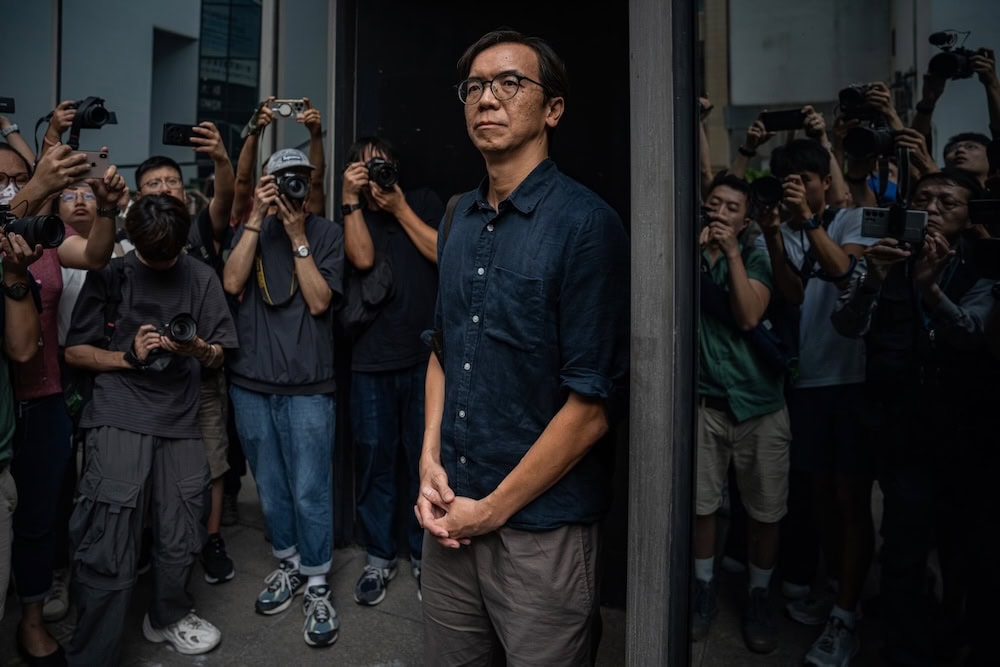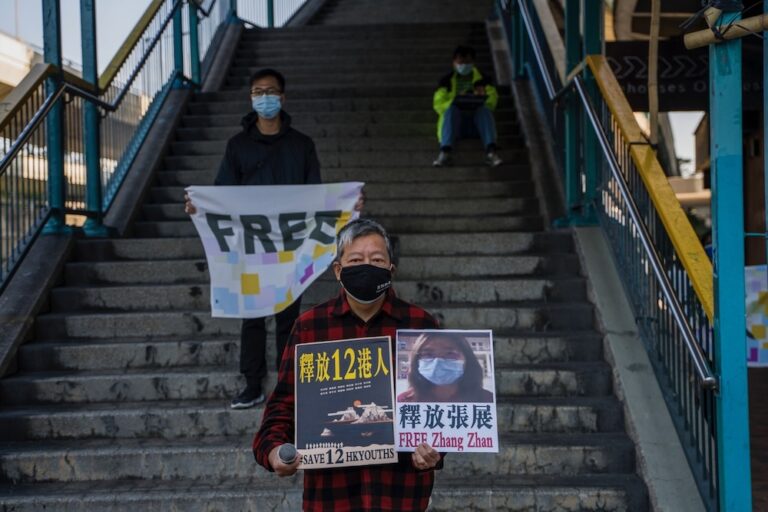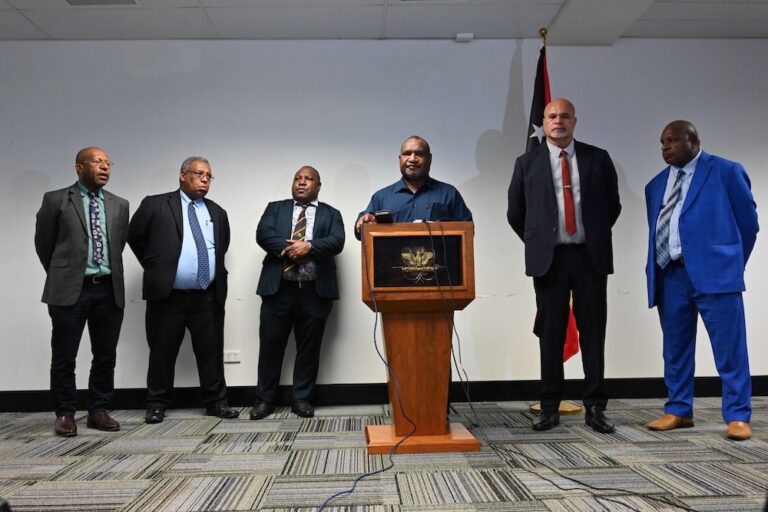September 2024 in Asia-Pacific: A free expression and civic space round-up produced by IFEX's regional editor Mong Palatino, based on IFEX member reports and news from the region.
How did IFEX members mark the International Day for Universal Access to Information? New reports showed the decline of media and academic freedom in Hong Kong, the Taliban issued another repressive directive for news outlets, and the Pacific Media Freedom Index was unveiled for the first time.
“Difficult, dangerous, and life-threatening”
IFEX members in Asia-Pacific marked the International Day for Universal Access to Information (IDUAI) by releasing reports and statements and organising events that highlight the challenges they face in promoting access to information.
The global theme for IDUAI 2024 is “Mainstreaming Access to Information and Participation in the Public Sector.” In Mongolia, the Globe International Center organised a multi-stakeholder discussion participated by more than 60 representatives from the government, civil society, and the media about the relevance of IDUAI in governance, including combating corruption.
For Mizzima News, this year’s IDUAI is a reminder of how access to reliable information plays a crucial role in upholding human rights in Myanmar, where the junta grabbed power in 2021 and continues to suppress pro-democracy forces. Its latest briefer on the country’s media situation showed that independent news work remains “difficult, dangerous, and life-threatening profession.” As of June 2024, around 58 journalists and news professionals were still behind bars.
In Malaysia, human rights groups reiterated the push for federal Right to Information legislation that is both comprehensive and accessible to all individuals. In addition, they called for a creation of an oversight body to oversee the implementation of the law, and demanded the review, amendment, and even repeal of existing laws that can obstruct access to information.
In Cambodia, civil society groups held a workshop to revitalise public awareness and support for the passage of that country’s Access to Information Law. The activity aimed to promote the message that access to information is “a fundamental human right that boosts investments and economic growth and the daily lives of citizens and their ability to fully participate in civic life.”
SFLC.in posted a thread on X (Twitter) citing laws and court rulings about the value of access to information as a fundamental right in India. It underscored that open access to information is “significant for enabling development, reducing inequality, and fostering a more inclusive and equitable society.” It added that upholding the right to information “can bridge the knowledge gap in rural areas, providing resources and learning materials to those who lack access to formal education systems.”
In Pakistan, Digital Rights Foundation (DRF) identified some of the information restrictions imposed by authorities this year, such as the prolonged banning of X (Twitter), VPN regulation, and firewall installation that degraded the quality of internet services. Instead of more restrictions, DRF “recommends more transparency in government initiatives and renewed effort to expand Internet coverage and digital literacy to underserved areas.”
Curtailment of academic and press freedom in Hong Kong
In Hong Kong, two journalists were convicted of sedition, troll “patriots” targeted dozens of journalists, and a new report detailed the negative impact of the National Security Legislation (NSL) on academic freedom.
On 29 August, journalists Chung Pui-kuen and Patrick Lam Shiu-tung of the now-defunct website Stand News were found guilty of “conspiracy to publish and reproduce seditious publications.” On 26 September, they were sentenced to 21 months and 11 months in prison, respectively. The judge in the case ruled that the publication allowed at least 11 articles that caused “potential detrimental consequences to national security.”
In a letter addressed to the court, Lam defended the paper’s coverage of pro-democracy protests:
“We documented Hong Kong as much as we could, leaving a first draft of history before the people and events disappeared… The only way for journalists to defend press freedom is to report.”
Media groups expressed dismay over the ruling. “The openly political nature of the verdict severely undermines claims that the Hong Kong judiciary is even pretending to uphold the law without fear or favour,” an excerpt from a joint statement issued by several global civil society organizations.
Meanwhile, IFEX member Hong Kong Journalists Association (HKJA) revealed a systematic and organised trolling operation that targeted journalists from June to August this year. Self-proclaimed “patriots” have sent anonymous letters threatening journalists’ family members, landlords, employers, and professional organisations. Around 36 journalists have been attacked and subjected to doxxing operations in various Facebook groups and Wikipedia pages.
“HKJA condemns these attempts by a small minority to use illegal means such as threats and harassment to hinder and scare journalists from performing their constitutionally-protected work,” the group asserted.
It is not just journalists who have been affected by the enforcement of NSL, but also academics and students. A new report by Human Rights Watch and Hong Kong Democracy Council warned against the decline of academic freedom in eight publicly funded universities.
It noted that scholars tend to self-censor to avoid prosecution under the NSL as university administrators imposed restrictions on student unions, peaceful protests, research grants, and conferences. Universities have also removed academics who are perceived to be critical to the Beijing government.
A researcher interviewed in the report shared the censorship of an academic article, which reflects the curtailment of free thinking in the city that was once a bastion of liberal ideas. “At the 11th hour, the editor told me she can’t publish it because the head of the school told her it’s too dangerous now. She didn’t want to put the editorial team at risk.”
Afghanistan bans live news broadcasts
Taliban authorities in Afghanistan issued a new directive banning live political broadcasts and limiting the “analysts” who can be interviewed by media outlets to 68 pre-approved names. IFEX member Afghanistan Journalists Center (AFJC) highlighted three articles in the directive that can seriously undermine the work of media:
- Programs should be recorded and should not be broadcast live;
- Experts must be invited according to the new list; inviting those whose names are not included in this list is forbidden;
- Challenging the laws, policies, and decisions of the Taliban government and criticizing Taliban officials without proof is prohibited.
AFJC said the directive is “another attempt to further weaken and suppress free media in the country” while the Committee to Protect Journalists urged authorities to “stop dragging Afghanistan back to the Stone Age.”
Since reclaiming power in August 2021, the Taliban has issued 21 restrictive and anti-women media directives including the passage of a law in August that banned images of living beings.
New and noteworthy
Pacific Islands Media Freedom Index. IFEX member Pacific Freedom Forum unveiled the first Pacific Islands Media Freedom Index report. The index is based on the responses of 73 editors, journalists, and media workers, many of whom have spent decades reporting the Pacific. Economic and financial constraints were mentioned as the biggest challenge many face in their work. The report also highlighted that around 60 percent of journalists “often practiced self-censorship due to fear of reprisals from their communities, families and others including in some cases, their governments.” Palau, Niue, and the Cook Islands topped the list for media freedom in 2023, while Nauru, Papua New Guinea, and Tuvalu scored lowest. Among the recommendations in the report is for governments to “guarantee the editorial autonomy of state-funded media and ensure equitable distribution of advertising and other resources to support a diverse media landscape.”
China Dissent Monitor. The latest edition of the monitoring program of Freedom House showed that 805 dissent events were recorded from April to June this year, an 18 percent increase over the same period in 2023. The majority of the protests were linked to labour and homeowner issues. Since its inception two years ago, the program has documented nearly 6,400 protests, with the cities of Shenzhen, Xi’an, and Sanya registering the highest number of protests related to economic grievances.
Engaging Tech for Internet Freedom in Vietnam. ARTICLE 19 and its partner Legal Initiatives for Vietnam have released a report on how foreign tech companies responded to the Vietnamese government’s requests for content moderation and access to users’ data. The report acknowledged the low compliance of companies over requests to access users’ data, but it flagged a 90 percent compliance rate in requests for content moderation, which includes regulation of content featuring government criticism. It added that Meta maintains a secret list of officials who cannot be criticized on Facebook. It urged companies to resist illegitimate government requests, protect user data, remove cyber troops and trolls that manipulate online discussion, and support the work of human rights defenders.



